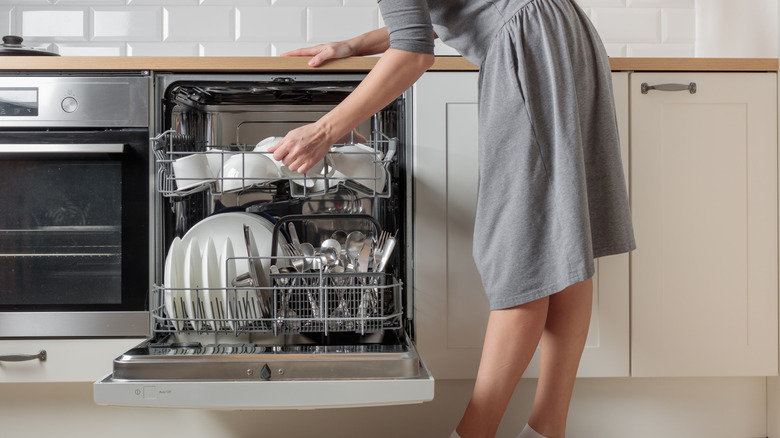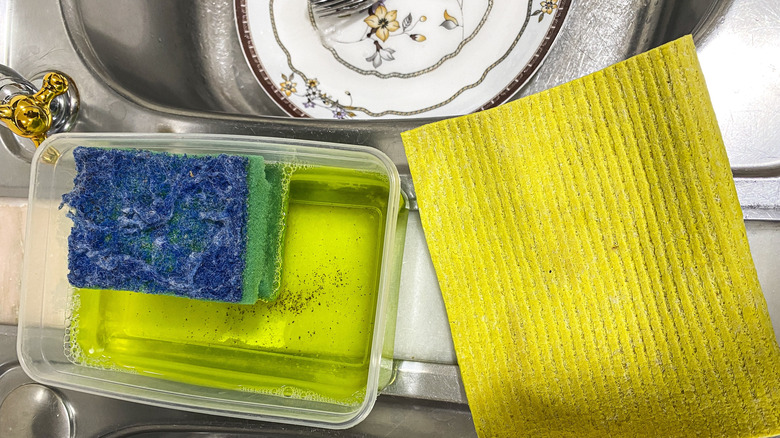Are Dishwashers More Sanitary Than Handwashing? This Is What Scientists Have To Say
For many households, the choice between washing dishes in the sink or by machine is a daily debate. Is scrubbing your dishes by hand the cleaner way, or can you trust dishwashers from the best brands to do a better job? It turns out that when you ask the experts, the answer is pretty clear, thanks to the science of how to safely deal with bacteria and viruses.
The simple answer is that dishwashers are far more effective at killing bacteria, period. Most dishwashers heat the water to at least 145º Fahrenheit, which is hot enough to kill off a wide range of harmful microbes. Washing dishes in water that hot would be at the very least uncomfortable, and could cause burns or skin damage with prolonged exposure. And while bacteria can accumulate near a dishwasher's rubber seals, most of those microbes are harmless. On the other hand, handwashing tools like sponges and cloths are loaded with the kind of fast-growing bacteria its best to avoid, although they're not among the germiest items you touch every day. If you still prefer handwashing, you should replace your sponges and dishcloths once a week and wash and sanitize them periodically using hot water, detergent, and a bleach solution.
Lab results favor using a dishwasher
If you've ever pulled a plate from the drying rack and wondered how clean it really is, that's entirely reasonable. Researchers at The Ohio State University have found that dishes cleaned in a machine tend to have less than 100 colony-forming units (CFUs), a threshold considered safe for humans. Compare that to hand-washed dishes, which can leave up to 6,000 CFUs behind depending on water temperature, sponge cleanliness, and drying methods. In fact, tea towels and air-drying racks used during handwashing can harbor more germs than the dishes themselves.
That said, not all machine dishwashing practices are equal. Light rinsing beforehand can be helpful, but full pre-washing wastes time, water, and energy. Also, you don't need piping hot water in the sink or heavy-duty scrubbing gloves; just scrape and quicky rinse your dishes and trust the machine. Modern dishwashers, especially Energy Star-rated models, use far less water and energy than washing by hand, although no dishwashers made our list of the most energy-efficient home appliances available in 2023. They're designed to handle stuck-on messes, adjust cycles using soil and load sensors, and generally only use a few gallons of water per load. You can easily go through 25 gallons of water or more while handwashing dishes, meaning an efficient dishwasher can save you thousands of gallons per year.
Washing dishes by hand can boost kids' immune systems
Interestingly, science doesn't fully come down against handwashing either, especially when it comes to families with kids. A study of over 1,000 Swedish children ages 7 and 8 found that kids from households that hand-washed dishes had a 40% lower chance of developing certain allergies than other children. The thinking is that some exposure to specific bacteria might help train the immune system, reducing conditions like eczema, asthma, and hay fever. This effect was even more prevalent in families that also ate fermented or farm-bought foods, which are rich in diverse microbes.
The study also found that lower-income families also saw a reduced risk of children developing these conditions, although it never found a cause-and-effect link and stopped short of recommending against dishwashers. The consensus was that not every household has a dishwasher, and a bit of natural exposure might be helpful in developing a healthy immune system. For daily cleaning, dishwashers still win. The key is to use yours properly: load the dishwasher completely without overstuffing it, clean it monthly on high heat, and keep the water lines, jets, and seals clean and in good condition. When used correctly, a dishwasher is clearly a cleaner, safer, and more eco-friendly choice than handwashing your dishes.


